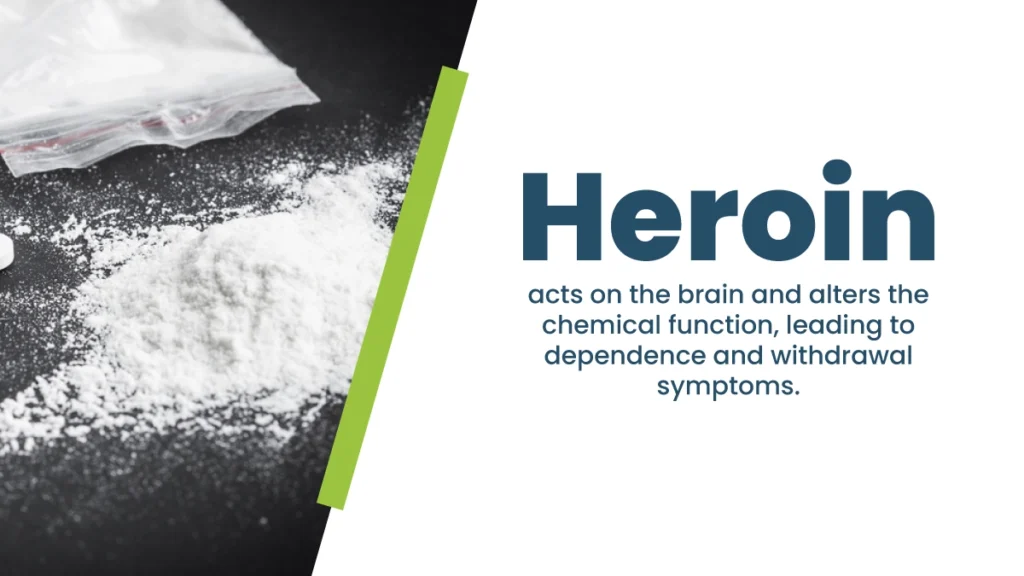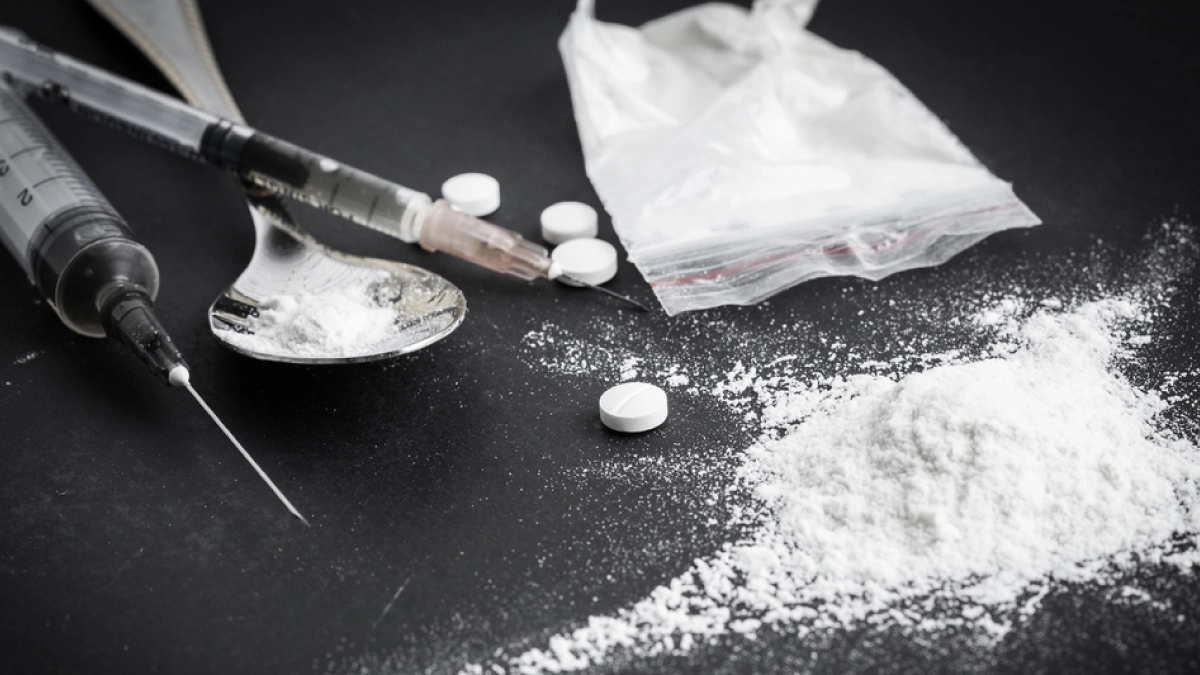Heroin is addictive because it deeply affects the brain and body. When people consume heroin, it binds to opioid receptors in the brain, causing a rush of pleasure and slowing heart rate.
Over time, the brain becomes dependent on heroin to feel good. When someone tries to stop using it, withdrawal symptoms like intense pain and anxiety can occur, making it hard to quit. Seeking help is crucial for overcoming heroin addiction, as breaking the cycle often requires support and treatment.
Key Takeaways
Heroin addiction alters brain function, creating a relentless cycle that’s hard to break. Here’s what you need to know:
- Heroin acts on the brain and alters the chemical function, leading to dependence and withdrawal symptoms.
- Long-term use brings physical and psychological harm, straining health and relationships.
- Understanding the cyclical nature and withdrawal spectrum is crucial in overcoming addiction.
The Haven Detox-New England stands with you. For assistance, Contact us at (844) 933-4145.

How Heroin Works on the Brain and Body
Heroin, an opioid drug derived from morphine, exerts its effects by binding to specific receptors in the brain known as opioid receptors. When ingested, heroin rapidly crosses the blood-brain barrier and converts back into morphine.
Once in the brain, it binds to opioid receptors, especially those involved in pleasure and pain regulation. This binding triggers a surge of euphoria and a sense of relaxation. Simultaneously, heroin slows down vital functions like heart rate and breathing. Prolonged heroin use alters the brain’s structure and function, leading to dependence.
Physical and Psychological Manifestations of Addiction
Heroin addiction, recognized as heroin use disorder, triggers various physical and psychological changes. The opioid crisis has heightened concerns due to the drug’s intense effects and the higher risk of heroin overdose. Understanding the signs is crucial for addressing heroin’s role in the opioid epidemic.
- Heroin use alters the brain’s chemistry, impacting decision-making and behavior.
- The euphoria from heroin use can result in drowsiness, nodding off, or slurred speech.
- Individuals with heroin use disorder face a higher risk of respiratory depression and heroin overdose.
- The uncontrollable urge to seek and use heroin, despite negative consequences, signifies a use disorder.
- As tolerance develops, users may escalate to high doses, increasing the risk of severe side effects.
Heroin addiction contributes to the broader opioid epidemic, affecting communities worldwide. Recognizing the physical and psychological manifestations of heroin addiction is pivotal in addressing the opioid crisis and supporting those affected.
Timely intervention and treatment are important in curbing the impact of heroin use disorder and reducing the risk of adverse outcomes like heroin overdose.
The Cyclical Nature of Heroin Addiction
Heroin, a highly addictive opioid drug, traps individuals in a relentless cycle of dependence. The drug impacts the brain’s reward system, flooding it with euphoric feelings upon use. Here’s how a person experiences tolerance and withdrawal signs:
The Accelerated Tolerance
As the nervous system and spinal cord are affected, the release of dopamine intensifies, reinforcing the desire for continued heroin use. Regular use of heroin leads to an accelerated tolerance, requiring higher doses or mixing it with alcohol to achieve the same euphoria.
This escalation in consumption contributes to the cycle of addiction, as individuals chase the initial pleasurable sensations that diminish with repeated use.
The Heroin Withdrawal
Attempts to break free from heroin’s grip unveil the harsh reality of physical dependence. The withdrawal spectrum encompasses a range of distressing symptoms, including cravings, anxiety, and pain. Such symptoms drive individuals to persist in the use of the drug to avoid these discomforts.
Understanding the cyclical nature, accelerated tolerance, and withdrawal spectrum sheds light on the complexity of heroin addiction.
Impact on Various Aspects of Life
Long-term heroin use impacts both the body and mind, causing significant harm. Physically, it can lead to deteriorating health, a weakened immune system, and respiratory issues. Mental health suffers, with increased risk of depression, anxiety, and cognitive impairments. The risk of overdose also escalates as tolerance builds.
Relationships may be strained, and employment stability is often jeopardized. Withdrawal symptoms intensify, making quitting challenging. Long-term heroin use not only affects the individual but also places financial pressure on healthcare systems and communities. That highlights the importance of addressing addiction with comprehensive support and treatment.
Treatment and Recovery From Heroin Addiction
Heroin addiction, a challenge faced by many, requires comprehensive treatment to promote recovery. Several accessible options provided by dedicated medical professionals aim to highlight both the physical and mental aspects of addiction.
Detox
Treatment often starts with heroin detox, a process where the body rids itself of the addictive drug. Medical professionals monitor individuals during this phase to manage withdrawal symptoms such as body aches and ensure a safe transition to the next steps of recovery.
Therapy
Behavioral therapies, including cognitive-behavioral therapy and group therapy, play a vital role in addressing the mental health aspects of heroin addiction. These therapeutic approaches help individuals understand and change behaviors, fostering a supportive environment for recovery.
Medications for Addiction Treatment
Medications are valuable tools in the treatment of heroin addiction. Some individuals may benefit from prescription drugs, which include medications like methadone, a semi-synthetic opioid that reduces cravings and withdrawal symptoms. Buprenorphine is another option that provides pain relief while helping manage addiction.
Treatment plans are tailored to individual needs, considering various factors such as the severity of heroin abuse, mental health disorders, and overall health. Medical teams work closely with individuals, providing professional help and guidance throughout recovery.
Frequently Asked Questions (FAQ)
Why is addiction so powerful?
Addiction is potent due to its impact on the brain’s reward system. Substances like prescription drugs or those derived from the opium poppy, such as opioids, trigger intense highs by binding to brain cells. This engagement disrupts the natural balance of neurotransmitters, creating a powerful desire for the substance.
Are some people more susceptible to heroin addiction than others? If so, why?
Yes, susceptibility to heroin addiction varies among individuals. Genetic predisposition, health problems, and environmental influences play a role.
Genetics can influence how the body reacts to substances, while existing health problems may heighten vulnerability. Additionally, environmental factors, including exposure to heroin or stressors, can contribute to susceptibility.
How addictive is heroin?
Heroin is highly addictive, ranking among the most potent opioids. Upon entering the body, it rapidly converts to morphine, attaching to opioid receptors in the brain and triggering intense euphoria.
The drug’s interaction with the brain’s reward system fosters a strong desire to continue its use. Heroin’s addictive nature is notably concerning, with the potential to lead individuals into a cycle of escalating drug use and opioid addictions, affecting vital functions regulated by the brain stem.
Overcome Heroin Addiction With The Haven Detox-New England
If you or someone you know is dealing with heroin addiction, then asking for help is the first step towards recovery. The Haven Detox-New England is here to aid you during your darkest times.
Our heroin detox program helps your body get rid of toxins and alleviate withdrawal symptoms. During residential treatment, we offer therapies and counseling in a drug-free setting to lower the risks of relapse. We believe effective recovery is possible, and methods like methadone-assisted treatment (MAT) have proven to be beneficial in treating opioid addiction.
It is time to regain hope. Contact us today at (844) 933-4145 for more information.




